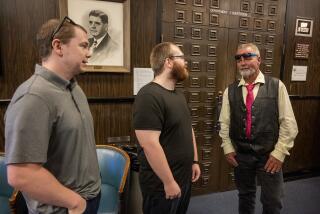Rothenberg Back in Jail After Breaking Parole : Crime: The man convicted of trying to burn his son to death eluded one parole officer and lied to another. He had, until then, been kept under constant surveillance.
- Share via
Eight months after his parole, the man who set his son on fire in a Buena Park motel was back in prison Monday after ducking out of an Oakland doughnut shop and eluding his parole agents for four hours.
State prison officials said Charles David Rothenberg’s whereabouts during that time remain a mystery, but that he broke his parole terms--which include constant surveillance--by eluding one agent and lying to another before showing up at an 11:30 a.m. job interview, where he was recaptured without resistance.
Rothenberg, 50, was taken to San Quentin state prison where he will be held for up to three months until a Board of Prisons hearing on the parole-violation charges can be held. If found guilty, Rothenberg could be imprisoned for up to six months.
David Rothenberg, who remains disfigured from the third-degree burns he suffered over 90% of his body in the 1983 fire, learned of his father’s brief freedom from surveillance when his mother picked him up after school.
“It was just, you know, I was glad they caught him and, you know, he was a couple hundred miles away,” said David, now 14 and a freshman in high school. “If they didn’t catch him I’d be scared, but I think after this, he should be put in prison for life.”
Tipton C. Kindel, spokesman for the state Department of Corrections, which oversees California’s prison system, said officials “don’t know why he did this, because he certainly knew it was not allowed under his parole. We don’t know why he would jeopardize what freedom he had to live on the outside . . . but it was a big mistake on his part.”
For the first time confirming where Rothenberg was paroled, Kindel said Rothenberg was en route to a job interview in Oakland, with a parole agent, as usual, in tow, when he was allowed to stop at a doughnut shop at 7:30 a.m. After “about a half-hour, long enough to sit and have a cup of coffee and a doughnut,” Rothenberg failed to emerge from the shop, Kindel said. The parole agent entered it and found that Rothenberg had slipped out a side or back entrance.
Meanwhile, Rothenberg called a second parole agent and said he was at another location. The second agent arrived at the spot but Rothenberg was not there, Kindel said.
“He was missing at this point, not where he was supposed to be,” Kindel said. “He deliberately eluded one agent, and lied to the second, both of which are violations of his parole in that he was not cooperating with parole agents.”
Rothenberg was released Jan. 24 under what officials declared to be the tightest security of any California parolee. His parole restrictions included 24-hour supervision by parole agents and an electronic anklet that alerts officials if it is removed or tampered with. Rothenberg served six years and five months of a 13-year sentence for the 1983 burning of his son, David, Rothenberg, then 6.
When he was recaptured, Rothenberg was still wearing the electronic anklet.
Kindel said parole agents, who formerly had supervised Rothenberg around the clock, still watch him constantly but no longer share the same dwelling with him.
“Parole agents don’t live with him anymore,” he said. He would not be more specific.
Kindel said that Rothenberg had earned the “confidence” and “trust” of the agents by following his parole guidelines and cooperating with authorities. And had Rothenberg secured a job, he “would have had the ability to do that under different parole restrictions,” which amounted to removing the 24-hour parole agents and requiring Rothenberg to be at home and work at certain times or risk a return to prison.
“He would still be under surveillance, but he could maybe have left where he was living, reported to work, got back to his house at a certain time, and had more freedom since he was doing OK,” Kindel said, adding:
“Now, we’ve said all along that we were not comfortable with paroling him, and today he made a very serious error in judgment.”
Rothenberg, who was divorced from David’s mother, took his son for what was to be a week’s vacation in upstate New York seven years ago. Instead, he took him to Orange County to visit Disneyland and Knott’s Berry Farm.
After seven days here, he tried to persuade his ex-wife, Marie Hafdahl, to give him more time with his son. But she had already suspected that Rothenberg was in California, and angrily threatened to withhold visitation rights if David was not brought home.
That night, March 3, 1983, Rothenberg took a jug of kerosene, doused the bedspread on which the kindergarten student slept, lit a match and fled the Buena Park motel where they were staying. He was captured a week later in San Francisco, pleaded guilty to attempted murder and other crimes linked to the fire and sentenced to 13 years in state prison. It was the maximum allowed at that time under laws that have since been changed.
His eventual parole was protested, and even Rothenberg himself said in interviews with The Times that he didn’t deserve freedom.
Once parole officials realized Monday that Rothenberg was missing, they tried contacting Marie Hafdahl, who married the Buena Park detective who supervised the 1983 fire investigation. Her work number had been changed, so they tried her at home but did not reach her. They then tried to contact her husband, Richard Hafdahl, at the police station, but he was on vacation.
Finally, parole officers called Anaheim police, and told them that Rothenberg was loose. Police planned to swing by David’s school and take him home, but his mother finally got word and picked him up.
“I thought they were going to watch him 24 hours a day,” Marie Hafdahl said Monday. “It makes me nervous.”
More to Read
Sign up for Essential California
The most important California stories and recommendations in your inbox every morning.
You may occasionally receive promotional content from the Los Angeles Times.













